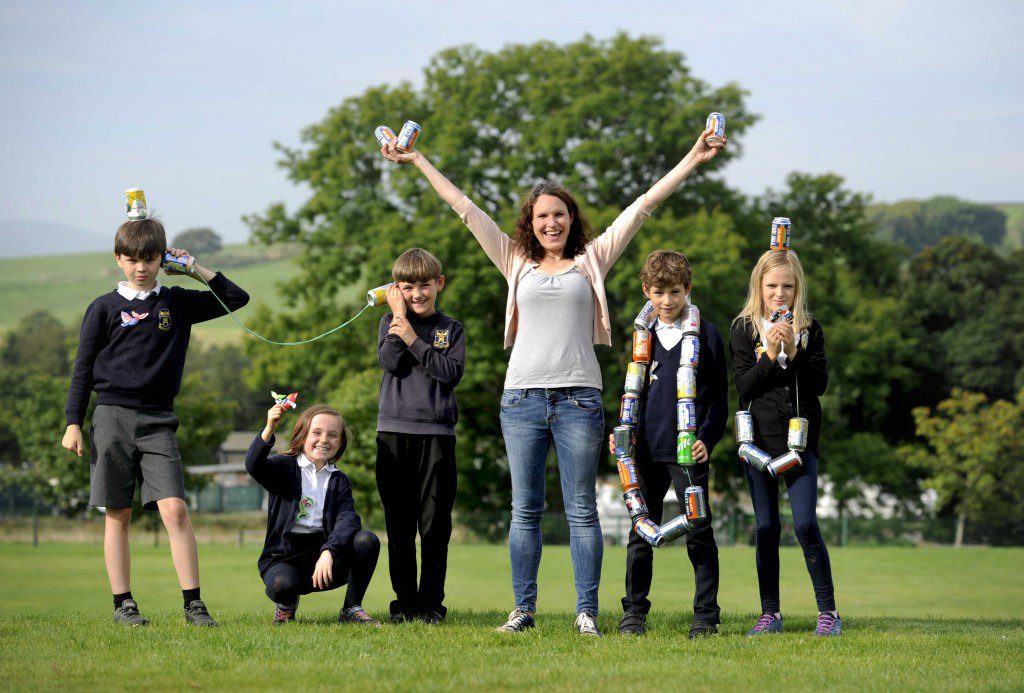Scottish schoolchildren have called on world leaders meeting at COP26 to bring about real change to halt climate change and ensure they inherit a sustainable planet.
They have also shown that one way ahead is through cutting waste by transforming used and unwanted items into useful or attractive things like bags or brooches.
Their words and creations feature in a new online display created by Edinburgh-based social impact business Ostrero and hosted by National Museums Scotland (NMS) called Designing for the Climate: A Circular Economy.
During the “Making Circles” project children took part in a variety of activities, including learning from professional artists and designers about how to use their creative skills to rid the world of waste.
Many, including pupils from Juniper Green Primary School in Edinburgh, Larbert Academy and Wester Hailes Education Centre (WHEC) contributed by designing or making items from waste and unwanted materials.
Classes from Duddingston Primary School, in Edinburgh, and Moffat Academy in Dumfries and Galloway, also wrote messages to leaders attending COP26, which takes place in Glasgow in November.
Their list of priorities includes:
- Banning fossil fuels
- Investing more in renewables
- Protecting wildlife and the environment
- Removing plastic waste from the oceans
- Reusing waste to make new products
- Saving forests
- Eliminating throw-away products
- Replacing factory goods with hand-crafted products.
One contributor also made a heartfelt plea for more bins with proper lids to stop gulls getting in.
Written comments from around 20 of the children feature in the display. Among them are contributions from Moffat’s P5 (then P4) class such as:
- “Stop the companies from making little plastic toys that we throw away. Stop using things that we don’t need,” wrote Joni Pattison and Felix Weatherstone.
- “Please save tigers and the jungle. And make all cars electric. And make sure no plastic goes into the ocean. So when you’re at a fast food restaurant and you take off the wrapper you could make it into something else, like origami. And instead of charging your phone you can attach a solar panel to your shirt,” wrote Brooklyn Proudfoot.
- “Please could you stop waste in the world because we’re running out of stuff,” wrote Thomas Brown.
Pupils from the P6 and P3 classes at Duddingston said:
- “I think the most important environmental issue is petrol cars. Make electric cars run on wind turbine energy to stop fossil fuels being used in cars. I want the leaders at COP26 to stop plastic packaging at the supermarket and to use, for example, cardboard pizza boxes and cardboard cartons of juice.” Aoife, P6.
- “I want leaders at COP26 to ban fossil fuels and invest in more renewable energy like wind farms, solar panels and even using less energy,” Leon, P6.
- “I think the most important environmental issue is the disposal of phones and laptops, and protecting animals. I want world leaders at COP26 to make a new way to dispose of phones and laptops. I also want to make a machine that can get all the plastic out of the water to save the animals.” Amelia, P6.
- “I want world leaders at COP26 to do more to protect endangered species and try to reduce the amount of plastic being dumped into the ocean.” David, P6.
- “Fewer factories, more handmade things. More bins with lids so no seagulls can get in.” Olivia, P6.
- “Stop wasting plastic. Help the world with climate change. Stop cutting down trees. Save the animals.” Ella C, Ella L, Elsie, P3.
Ostrero was founded in 2016 by Mary Michel and Marian Brown and has been working with the creative sector, teachers, pupils and many others to show how we can design, make and use things differently and in doing so protect the world’s natural and human resources.
Marian said: “When leaders gather at COP26 they will be making decisions that will decide what kind of world our children will inherit. Today’s young people are highly aware of the issues at stake and deeply concerned about climate change, pollution and environmental degradation.
“Their interest in a circular economy, that minimises waste, and their wonderful creativity should give us all hope and a sense of pride in our young people.
“The comments we received from classes underline that they want to see change. It is only right that their words should be heard and their aspirations respected as it is they who will have to endure the potentially devastating effects of climate change – and of the failures by our generation and those that came before us to act sooner to create a sustainable world.”
Designing for the Climate: A Circular Economy can be seen on the NMS website at https://www.nms.ac.uk and has been supported by Creative Scotland.
Iain Munro, Chief Executive at Creative Scotland said: “There is no greater challenge facing us and our life on this planet than the climate crisis.
“Addressing the issue requires major societal change, and it is imperative that young people are at the heart of the conversion to help shape how we address the issue and its impact on their future.
“We are pleased to support Ostrero to create this important platform at the National Museums Scotland for these young voices to be heard, thanks to funding from the National Lottery.”





